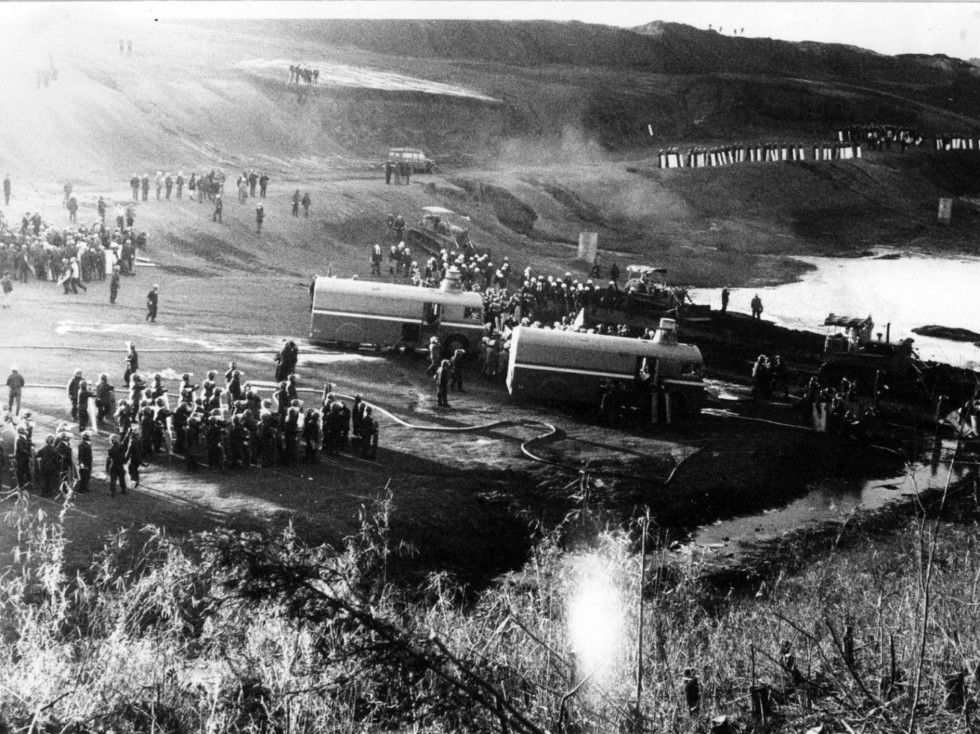
Still from Sanrizuka by Ogawa Productions, Japan, 1971
The Film Club: Sanrizuka
LIVE-STREAM AND CONVERSATION
29.1 2021
Stockholm
Ogawa Productions was a Japanese filmmaking collective that was founded in the 1960s. It was directed by Ogawa Shinsuke (1935–1992). After making films about the student movement, the collective moved to Sanrizuka to cover the struggle against the building of the Narita Airport. Japan assisted the United States with transportation to Vietnam, which upset parts of the Japanese population. While there, they made eight films covering the struggle.
Sanrizuka – Peasants of the Second Fortress
Live-Stream and conversation.
Date: Friday 29 January 2021
Time: at 13.00–17.00
Place: online
Language: English, Japanese with English subtitles.
Do you want information about the Film Club and our screenings? Become a member! Membership is free. Become a member by sending your name and email address to filmklubben@modernamuseet.se (membership communication is in Swedish).
Programme
13.00–13.15
Welcome by Benjamin Gerdes, senior lecturer of fine art with emphasis in moving image at the Royal Institute of Art and Markus Nornes, Professor of Asian Cinema, University of Michigan, gives an introduction.
13.15–15.45
Live streaming of ”Sanrizuka – Peasants of the Second Fortress”
15.45–16.00
Break
16.00–ca 16.45
Conversation with Tess Takahashi, scholar, writer, and programmer, Becca Voelcker, writer and researcher, and Benjamin Gerdes, Senior Lecturer of Fine Art, and a Q&A.
About Sanrizuka – Peasants of the Second Fortress (1971)
Original title: Sanrizuka – Daini toride no hitobito
By: Ogawa Productions, Japan
16mm transferred to digital video, b/w
143 mins
Print courtesy of Athénée Français Cultural Center, Tokyo
”In Japan, guerrilla film activity reached high intensity during the war (Vietnam). The use made of Japan as a conduit for Vietnam war supplies generated strong anti-government feelings and many ‘protest films.’… It now saw such powerful films as the Sanrizuka series- three feature length films. The heavy air traffic through Japan–swollen by the war–had prompted a 1966 decision to build a new international airport for Tokyo. The area chosen, Sanrizuka, was occupied by farmers who were determined to block seizures of their lands. For four years, the film maker Shinsuke Ogawa documented their struggle, which reached its climax in the third film, The Peasants of the Second Fortress. Here we see resistance turning into a pitched battle with riot police as farm women chain themselves to impoverished stockades, and students join the struggle for anti-government, anti-war motives. Ogawa, patiently recording the growth of resistance…achieved an extraordinary social document, and one of the most potent of protest films.” – Erik Barnouw, ”Documentary: A History of the Non-Fiction Film”, (Oxford University Press, 1974).
About the participants
Benjamin Gerdes, senior lecturer of fine art with emphasis in moving image at the Royal Institute of Art.
Markus Nornes, Professor of Asian Cinema, University of Michigan. Author of ”Forest of Pressure: Ogawa Shinsuke and Postwar Japanese Documentary”. Former Coordinator, Yamagata International Documentary Film Festival (Japan).
Tess Takahashi is a Toronto-based scholar, writer, and programmer who focuses on the politics of experimental moving image arts. She is currently working on two books, ”On Magnitude”, which considers artists’ work in relation to the enormous scale of big data, and ”Impure Film (1968–2008)”, which connects the fields of documentary and art. She is a member of the editorial collective for ”Camera Obscura: Feminism, Culture, and Media”. Takahashi’s writing has been published there as well as in Cinema Journal, the Millennium Film Journal, Animation, MIRAGE, and Cinema Scope, among others.
Becca Voelcker is a writer and researcher currently completing a PhD at Harvard University. Her research explores the politics of place in film and visual culture. She has lived in Britain, Japan, and the US, and is now based in London. Voelcker combines research with curating and programming projects, writes for journals including Film Comment and Sight & Sound, and podcasts.
The screening is in collaboration with The Royal Institute of Art.
ABOUT THE FILM CLUB
The Film Club features films and discussions on Friday evenings – at the museum or live-streamed on the web site.
The Film Club resurrected in 2018 and presents films on the boundary between art and documentary. Often, the artist or director will take part in discussions after the screenings. The 2021 spring programme is compiled in collaboration with the Royal Institute of Art.
Film has had a prominent position at the Museum since the start. The Moderna Museet Film Club has existed since the Museum opened in 1958, showing everything from children’s matinees to the latest experimental art films.
During the 1990’s and early 2000’s the museum presented international artists in the series Contemporary Film and Video. Other screening have often been held in connection with exhibitions at the museum or in collaboration with The Royal Academy of Art, Filmform, Cinemateket, Tempo Documentary Film Festival, Cinemafrica, Stockholm’s Feminist Film Festival, among others.
Previous programme: The Film Club
The Film Club editorial team
Lena Essling, curator, Catrin Lundqvist, curator.
